外研版(2019必修第一册 Unit4 Friends forever Using language 名师课件(37张ppt)
文档属性
| 名称 | 外研版(2019必修第一册 Unit4 Friends forever Using language 名师课件(37张ppt) | 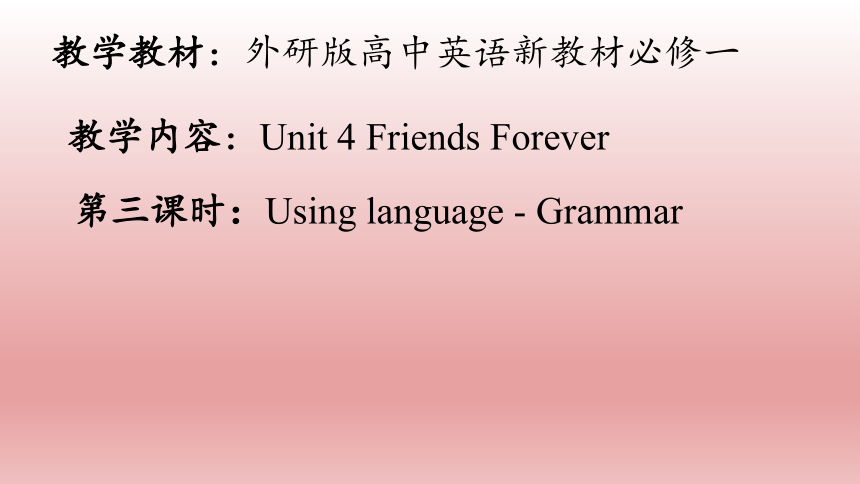 | |
| 格式 | pptx | ||
| 文件大小 | 6.8MB | ||
| 资源类型 | 教案 | ||
| 版本资源 | 外研版(2019) | ||
| 科目 | 英语 | ||
| 更新时间 | 2023-02-26 11:13:36 | ||
图片预览

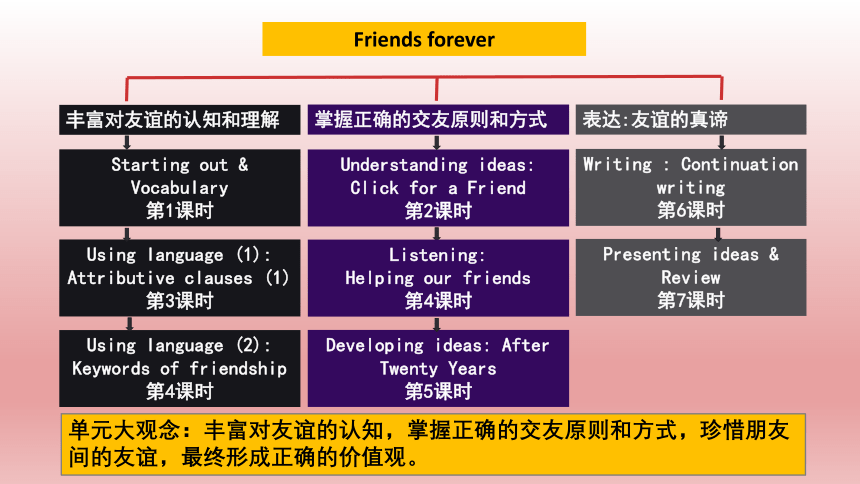


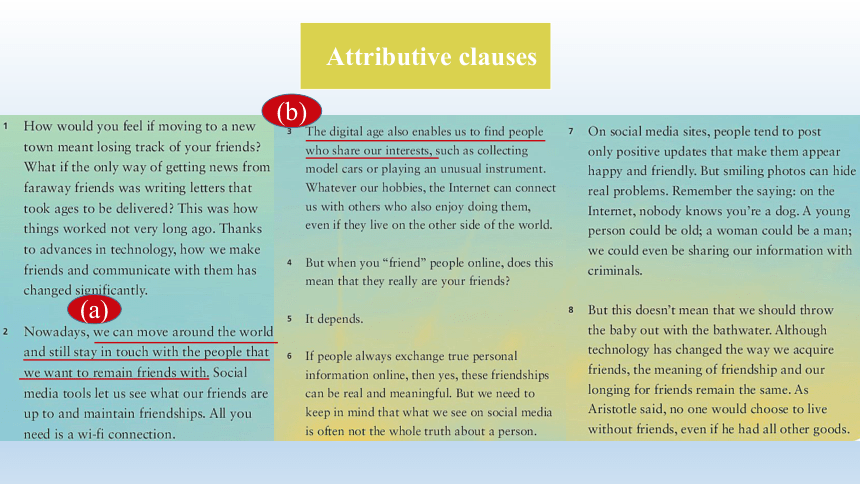
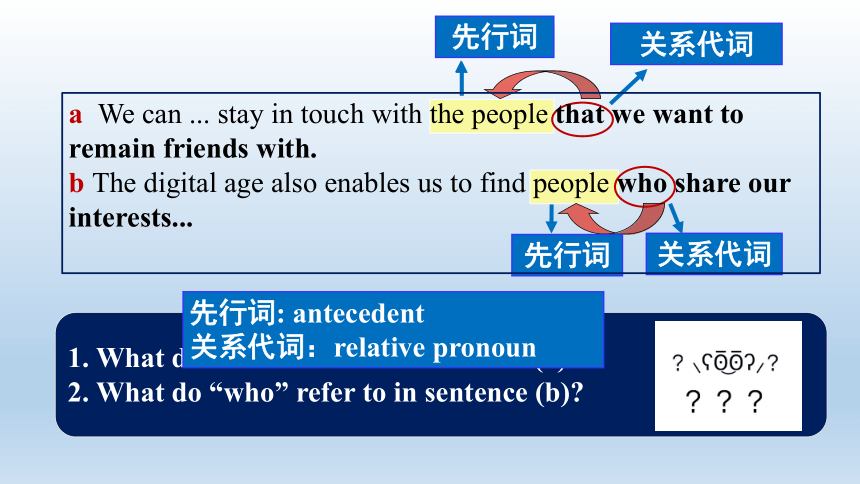
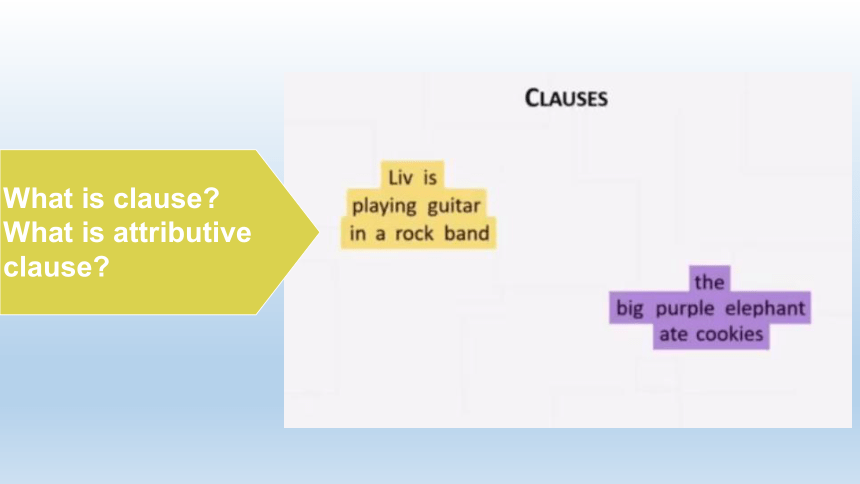
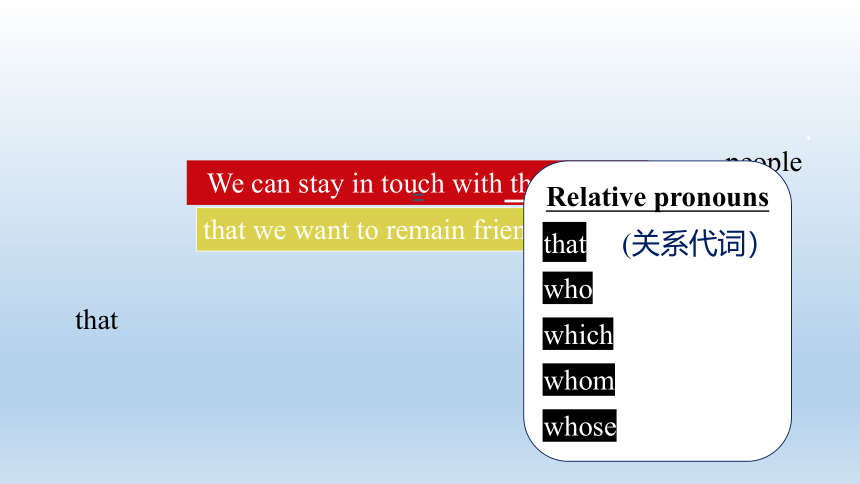
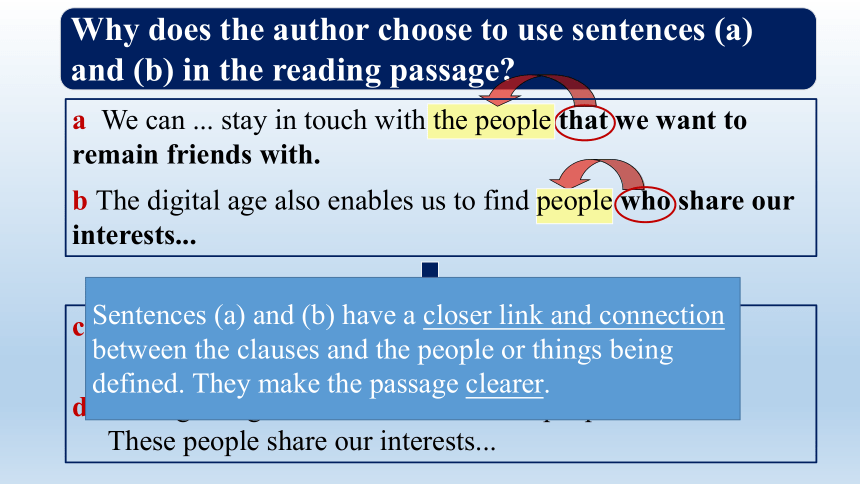


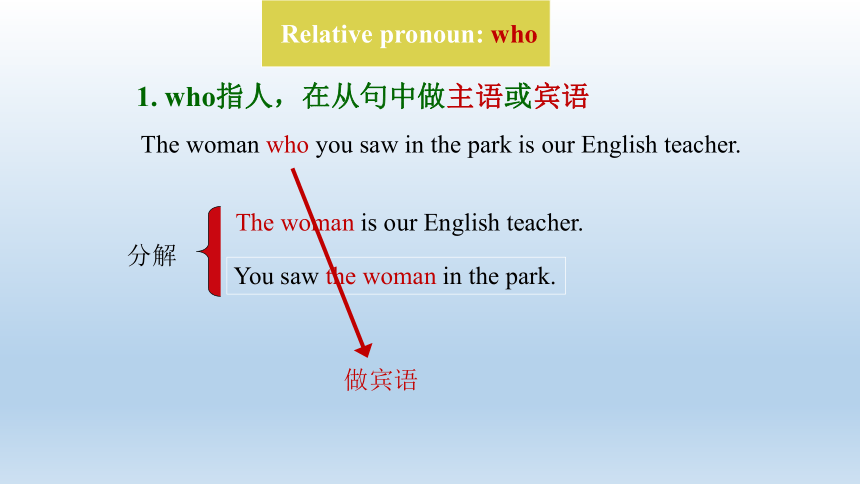
文档简介
(共37张PPT)
教学教材:外研版高中英语新教材必修一
教学内容:Unit 4 Friends Forever
第三课时:Using language - Grammar
Friends forever
丰富对友谊的认知和理解
掌握正确的交友原则和方式
表达:友谊的真谛
Starting out & Vocabulary
第1课时
Using language (1):
Attributive clauses (1)
第3课时
Using language (2):
Keywords of friendship
第4课时
Understanding ideas: Click for a Friend
第2课时
Developing ideas: After Twenty Years
第5课时
Writing : Continuation writing
第6课时
Presenting ideas & Review
第7课时
单元大观念:丰富对友谊的认知,掌握正确的交友原则和方式,珍惜朋友间的友谊,最终形成正确的价值观。
Listening:
Helping our friends
第4课时
Friends Forever
Using language-Grammar
Attributive Clauses(1)
定语从句
CLICK FOR
A FRIEND
Main idea
Attributive clauses
(a)
(b)
先行词
关系代词
先行词
关系代词
1. What do “that” refer to in sentence (a)
2. What do “who” refer to in sentence (b)
先行词: antecedent
关系代词:relative pronoun
a We can ... stay in touch with the people that we want to remain friends with.
b The digital age also enables us to find people who share our interests...
What is clause
What is attributive clause
We can stay in touch with the people that we want to remain friends with.
We can stay in touch with the people
that we want to remain friends with.
.
that
people
=
Relative pronouns
that (关系代词)
who
which
whom
whose
c We can ... stay in touch with the people.
We want to remain friends with them.
d The digital age also enables us to find people.
These people share our interests...
Why does the author choose to use sentences (a) and (b) in the reading passage
a We can ... stay in touch with the people that we want to remain friends with.
b The digital age also enables us to find people who share our interests...
Sentences (a) and (b) have a closer link and connection between the clauses and the people or things being defined. They make the passage clearer.
Look for more attributive clauses in the reading passage.
Relative pronoun: who
1. who指人,在从句中做主语或宾语
The boys who are playing football are from Class One.
分解
The boys are from Class One.
The boys are playing football.
做主语
Relative pronoun: who
1. who指人,在从句中做主语或宾语
The woman who you saw in the park is our English teacher.
分解
The woman is our English teacher.
You saw the woman in the park.
做宾语
Relative pronoun: who
1. who指人,在从句中做主语或宾语
The man who called yesterday wants to buy the house.
The man plans to find four musicians who could sing.
The family who I met at the airport were very kind.
Relative pronoun: whom
2. whom也指人,但在定语从句中充当宾语,常可省略。
Mr. Liu is the man (whom) you talked about.
分解
You talked about the man.
注意:关系代词whom在口语和非正式语体中常用who代替,可省略。
作宾语
Mr. Liu is the man.
Relative pronoun: whom
Chen Zijiang is a paper-cutting expert whom I saw yesterday.
2. whom也指人,但在定语从句中充当宾语,常可省略。
Do you remember the boy with whom I used to go out
注意:whom在从句中作介词的宾语,且宾语置于whom前时不能用who代替。
Relative pronoun: whose
3. whose 作定语从句的定语.
I know the girl whose mother is a teacher.
分解
I know the girl.
The girl’s mother is a teacher.
作定语
名词所有格
Relative pronoun: whose
3. whose 作定语从句的定语
He's a man whose opinion I respect.
It's the house whose door is painted red.
Relative pronoun: which
A shoe shop is a shop which sells shoes.
4. which指物,在从句中做主语或宾语
分解
A shoe shop is a shop.
The shop sells shoes.
做主语
Relative pronoun: which
He told us about the countries which he had visited.
4. which指物,在从句中做主语或宾语
分解
He told us about the countries.
He had visited the countries.
做宾语
Relative pronoun: which
He prefers groups which play quiet and slow songs.
4. which指物,在从句中做主语或宾语
This is the book which he is looking for.
Relative pronoun: that
可省略
The woman (whom / that) they wanted to visit is a teacher.
The man who / that is speaking at the meeting is a worker.
which = that who = that
5. that 可以作定语从句的主语和宾语.
Relative pronoun: that
The students are reading the books which / that were written by Moyan.
The video (which/that) we made last year was very interesting.
which = that who = that
可省略
5. that 可以作定语从句的主语和宾语.
Relative pronoun: who
The woman (who/whom/that) you met on the street worked in a hospital.
The pen (which/that) I bought yesterday is on the desk.
which = that who = that
可省略
5. that 可以作定语从句的主语和宾语.
如何选定定语从句关系词
1.分辨主句和定语从句
2.确定定语从句的先行词(人/物/人和物)
3.把先行词带到从句中,看其在定语从句中充当的成分(主语 宾语 定语)
4.若先行词在从句中做主语,宾语或定语则用关系代词。
指代内容 所作成分 是否可省略
that 人;物 主语,宾语 作宾语可省略
which 物 主语,宾语 作宾语可省略
who 人 主语,宾语 作宾语可省略
whom 人 宾语 可省略
whose (人/物)的 定语 不可省略
1. We weren’t playing on the court __________was next to our building.
Step 1 先行词是___________;
Step 2 将先行词代入定语从句中连成一句话:
____________________________________
Step 3 看关系词在定语从句中充当________的位置,是(人?物?),用___________。
Practice:Later that afternoon, another quake ___________ was almost as strong as the first one shook Tangshan again.
the court
The court was next to our building.
主语
which/ that
which/ that
which/ that
Fill in the blanks with relative pronoun(s)
that, which, who, whom or whose.
2. Paul’s favourite player was a guy __________ played for the school team.
Step 1 先行词是___________;
Step 2 将先行词代入定语从句中连成一句话:
____________________________________
Step 3 看关系词在定语从句中充当________的位置,是(人?物?),用___________。
Practice: They were well trained by their masters _________ had great experience with caring for these animals.
a guy
The guy played for the school team.
主语
who/ that
who/ that
who/ that
Fill in the blanks with relative pronoun(s)
that, which, who, whom or whose.
3. He’d soon get the chance _______________ he’d been waiting for.
Step 1 先行词是___________;
Step 2 将先行词代入定语从句中连成一句话:
____________________________________
Step 3 看关系词在定语从句中充当________的位置,是(人?物?),用_______________。
Practice:If you often go on a trip, you can gain much knowledge
_______________ you can not get from books.
the chance
He’d been waiting for the chance.
宾语
which/ that/不填
which/ that/不填
which/ that/不填
Fill in the blanks with relative pronoun(s)
that, which, who, whom or whose.
4.The thief ____________ the police caught last night has been sent to prison.
Step 1 先行词是___________;
Step 2 将先行词代入定语从句中连成一句话:
____________________________________
Step 3 看关系词在定语从句中充当________的位置,是(人?物?),用________________________。
Practice: Rose is the person __________________ you should look after.
the thief
The police caught the thief last night.
宾语
who/whom/ that/不填
who/whom/ that/不填
Fill in the blanks with relative pronoun(s)
that, which, who, whom or whose.
who/whom/
that/不填
5. The girl ______ hair is golden is from England.
Step 1 先行词是___________;
Step 2 将先行词代入定语从句中连成一句话:
__________________________
Step 3 看关系词在定语从句中充当________的位置,是(人?物?),用___________。
Practice: Look out! Don’t get too close to the house ______ roof is under repair.
the girl
The girl’s hair is golden.
定语
whose
whose
Fill in the blanks with relative pronoun(s)
that, which, who, whom or whose.
whose
6. And clearly, all the extra hours _______ he'd spent practising alone paid off.
Step 1 先行词是___________;
Step 2 将先行词代入定语从句中连成一句话:
__________________________________________
Step 3 看关系词在定语从句中充当________的位置,是(人?物?),用___________。
Practice:
This is the most exciting football game ________ I have ever seen.
I can remember well the persons and some pictures ________I saw in the room.
the hours
He'd spent the hours practising alone.
宾语
that/不填
that/不填
that/不填
Fill in the blanks with relative pronoun(s)
that, which, who, whom or whose.
that/不填
Lucy is my friend who / that has a hearing problem.
So I learnt a new language which / that allows me to “speak” with my hands.
Lucy is a smart girl whose ideas are always inspiring.
I sometimes have problems (that / which) I can’t solve.
Lucy is a good listener (whom / who / that) I enjoy sharing moments of my life with.
P41 Activity 2
Rewrite the underlined sentences with that, which, who, whom or whose.
Complete the online forum post with that, which, who, whom or whose.
that /which
whose
who / that
which / that
whom/who
P41 Activity 3
Homework
1. 我是一个外向的女孩。我在组织学校活动方面有丰富的经验。
2. 我写这封信是为了给你提出一些建议。这些建议也许会对你有帮助。
Advanced Writing – using attributive clauses!
Translation:
我们学校每年都举行这个活动,它旨在给我们提供一个展示自我的平台。
Step 1 分主从写出两句话
主句_____________________________________________________________
从句_____________________________________________________________
Step 2 定先行词,确定关系词,分析合并成定语从句
The activity is intended to provide a platform for us to show ourselves.
The activity is held in our school every year.
The activity which/that is held in our school every year is intended to provide a platform for us to show ourselves.
Example:
Homework
1. 我是一个外向的女孩。我在组织学校活动方面有丰富的经验。
2. 我写这封信是为了给你提出一些建议。这些建议也许会对你有帮助。
Advanced Writing – using attributive clauses!
Translation:
Thank you!
教学教材:外研版高中英语新教材必修一
教学内容:Unit 4 Friends Forever
第三课时:Using language - Grammar
Friends forever
丰富对友谊的认知和理解
掌握正确的交友原则和方式
表达:友谊的真谛
Starting out & Vocabulary
第1课时
Using language (1):
Attributive clauses (1)
第3课时
Using language (2):
Keywords of friendship
第4课时
Understanding ideas: Click for a Friend
第2课时
Developing ideas: After Twenty Years
第5课时
Writing : Continuation writing
第6课时
Presenting ideas & Review
第7课时
单元大观念:丰富对友谊的认知,掌握正确的交友原则和方式,珍惜朋友间的友谊,最终形成正确的价值观。
Listening:
Helping our friends
第4课时
Friends Forever
Using language-Grammar
Attributive Clauses(1)
定语从句
CLICK FOR
A FRIEND
Main idea
Attributive clauses
(a)
(b)
先行词
关系代词
先行词
关系代词
1. What do “that” refer to in sentence (a)
2. What do “who” refer to in sentence (b)
先行词: antecedent
关系代词:relative pronoun
a We can ... stay in touch with the people that we want to remain friends with.
b The digital age also enables us to find people who share our interests...
What is clause
What is attributive clause
We can stay in touch with the people that we want to remain friends with.
We can stay in touch with the people
that we want to remain friends with.
.
that
people
=
Relative pronouns
that (关系代词)
who
which
whom
whose
c We can ... stay in touch with the people.
We want to remain friends with them.
d The digital age also enables us to find people.
These people share our interests...
Why does the author choose to use sentences (a) and (b) in the reading passage
a We can ... stay in touch with the people that we want to remain friends with.
b The digital age also enables us to find people who share our interests...
Sentences (a) and (b) have a closer link and connection between the clauses and the people or things being defined. They make the passage clearer.
Look for more attributive clauses in the reading passage.
Relative pronoun: who
1. who指人,在从句中做主语或宾语
The boys who are playing football are from Class One.
分解
The boys are from Class One.
The boys are playing football.
做主语
Relative pronoun: who
1. who指人,在从句中做主语或宾语
The woman who you saw in the park is our English teacher.
分解
The woman is our English teacher.
You saw the woman in the park.
做宾语
Relative pronoun: who
1. who指人,在从句中做主语或宾语
The man who called yesterday wants to buy the house.
The man plans to find four musicians who could sing.
The family who I met at the airport were very kind.
Relative pronoun: whom
2. whom也指人,但在定语从句中充当宾语,常可省略。
Mr. Liu is the man (whom) you talked about.
分解
You talked about the man.
注意:关系代词whom在口语和非正式语体中常用who代替,可省略。
作宾语
Mr. Liu is the man.
Relative pronoun: whom
Chen Zijiang is a paper-cutting expert whom I saw yesterday.
2. whom也指人,但在定语从句中充当宾语,常可省略。
Do you remember the boy with whom I used to go out
注意:whom在从句中作介词的宾语,且宾语置于whom前时不能用who代替。
Relative pronoun: whose
3. whose 作定语从句的定语.
I know the girl whose mother is a teacher.
分解
I know the girl.
The girl’s mother is a teacher.
作定语
名词所有格
Relative pronoun: whose
3. whose 作定语从句的定语
He's a man whose opinion I respect.
It's the house whose door is painted red.
Relative pronoun: which
A shoe shop is a shop which sells shoes.
4. which指物,在从句中做主语或宾语
分解
A shoe shop is a shop.
The shop sells shoes.
做主语
Relative pronoun: which
He told us about the countries which he had visited.
4. which指物,在从句中做主语或宾语
分解
He told us about the countries.
He had visited the countries.
做宾语
Relative pronoun: which
He prefers groups which play quiet and slow songs.
4. which指物,在从句中做主语或宾语
This is the book which he is looking for.
Relative pronoun: that
可省略
The woman (whom / that) they wanted to visit is a teacher.
The man who / that is speaking at the meeting is a worker.
which = that who = that
5. that 可以作定语从句的主语和宾语.
Relative pronoun: that
The students are reading the books which / that were written by Moyan.
The video (which/that) we made last year was very interesting.
which = that who = that
可省略
5. that 可以作定语从句的主语和宾语.
Relative pronoun: who
The woman (who/whom/that) you met on the street worked in a hospital.
The pen (which/that) I bought yesterday is on the desk.
which = that who = that
可省略
5. that 可以作定语从句的主语和宾语.
如何选定定语从句关系词
1.分辨主句和定语从句
2.确定定语从句的先行词(人/物/人和物)
3.把先行词带到从句中,看其在定语从句中充当的成分(主语 宾语 定语)
4.若先行词在从句中做主语,宾语或定语则用关系代词。
指代内容 所作成分 是否可省略
that 人;物 主语,宾语 作宾语可省略
which 物 主语,宾语 作宾语可省略
who 人 主语,宾语 作宾语可省略
whom 人 宾语 可省略
whose (人/物)的 定语 不可省略
1. We weren’t playing on the court __________was next to our building.
Step 1 先行词是___________;
Step 2 将先行词代入定语从句中连成一句话:
____________________________________
Step 3 看关系词在定语从句中充当________的位置,是(人?物?),用___________。
Practice:Later that afternoon, another quake ___________ was almost as strong as the first one shook Tangshan again.
the court
The court was next to our building.
主语
which/ that
which/ that
which/ that
Fill in the blanks with relative pronoun(s)
that, which, who, whom or whose.
2. Paul’s favourite player was a guy __________ played for the school team.
Step 1 先行词是___________;
Step 2 将先行词代入定语从句中连成一句话:
____________________________________
Step 3 看关系词在定语从句中充当________的位置,是(人?物?),用___________。
Practice: They were well trained by their masters _________ had great experience with caring for these animals.
a guy
The guy played for the school team.
主语
who/ that
who/ that
who/ that
Fill in the blanks with relative pronoun(s)
that, which, who, whom or whose.
3. He’d soon get the chance _______________ he’d been waiting for.
Step 1 先行词是___________;
Step 2 将先行词代入定语从句中连成一句话:
____________________________________
Step 3 看关系词在定语从句中充当________的位置,是(人?物?),用_______________。
Practice:If you often go on a trip, you can gain much knowledge
_______________ you can not get from books.
the chance
He’d been waiting for the chance.
宾语
which/ that/不填
which/ that/不填
which/ that/不填
Fill in the blanks with relative pronoun(s)
that, which, who, whom or whose.
4.The thief ____________ the police caught last night has been sent to prison.
Step 1 先行词是___________;
Step 2 将先行词代入定语从句中连成一句话:
____________________________________
Step 3 看关系词在定语从句中充当________的位置,是(人?物?),用________________________。
Practice: Rose is the person __________________ you should look after.
the thief
The police caught the thief last night.
宾语
who/whom/ that/不填
who/whom/ that/不填
Fill in the blanks with relative pronoun(s)
that, which, who, whom or whose.
who/whom/
that/不填
5. The girl ______ hair is golden is from England.
Step 1 先行词是___________;
Step 2 将先行词代入定语从句中连成一句话:
__________________________
Step 3 看关系词在定语从句中充当________的位置,是(人?物?),用___________。
Practice: Look out! Don’t get too close to the house ______ roof is under repair.
the girl
The girl’s hair is golden.
定语
whose
whose
Fill in the blanks with relative pronoun(s)
that, which, who, whom or whose.
whose
6. And clearly, all the extra hours _______ he'd spent practising alone paid off.
Step 1 先行词是___________;
Step 2 将先行词代入定语从句中连成一句话:
__________________________________________
Step 3 看关系词在定语从句中充当________的位置,是(人?物?),用___________。
Practice:
This is the most exciting football game ________ I have ever seen.
I can remember well the persons and some pictures ________I saw in the room.
the hours
He'd spent the hours practising alone.
宾语
that/不填
that/不填
that/不填
Fill in the blanks with relative pronoun(s)
that, which, who, whom or whose.
that/不填
Lucy is my friend who / that has a hearing problem.
So I learnt a new language which / that allows me to “speak” with my hands.
Lucy is a smart girl whose ideas are always inspiring.
I sometimes have problems (that / which) I can’t solve.
Lucy is a good listener (whom / who / that) I enjoy sharing moments of my life with.
P41 Activity 2
Rewrite the underlined sentences with that, which, who, whom or whose.
Complete the online forum post with that, which, who, whom or whose.
that /which
whose
who / that
which / that
whom/who
P41 Activity 3
Homework
1. 我是一个外向的女孩。我在组织学校活动方面有丰富的经验。
2. 我写这封信是为了给你提出一些建议。这些建议也许会对你有帮助。
Advanced Writing – using attributive clauses!
Translation:
我们学校每年都举行这个活动,它旨在给我们提供一个展示自我的平台。
Step 1 分主从写出两句话
主句_____________________________________________________________
从句_____________________________________________________________
Step 2 定先行词,确定关系词,分析合并成定语从句
The activity is intended to provide a platform for us to show ourselves.
The activity is held in our school every year.
The activity which/that is held in our school every year is intended to provide a platform for us to show ourselves.
Example:
Homework
1. 我是一个外向的女孩。我在组织学校活动方面有丰富的经验。
2. 我写这封信是为了给你提出一些建议。这些建议也许会对你有帮助。
Advanced Writing – using attributive clauses!
Translation:
Thank you!
